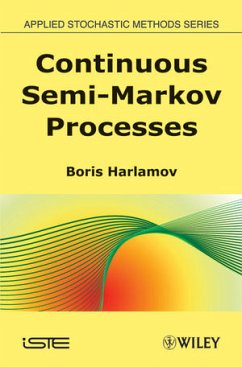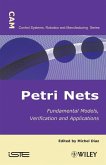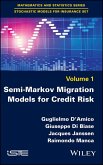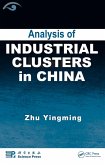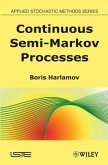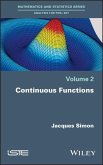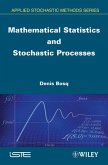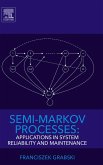Continuous Semi-Markov Processes (eBook, ePUB)


Alle Infos zum eBook verschenken

Continuous Semi-Markov Processes (eBook, ePUB)
- Format: ePub
- Merkliste
- Auf die Merkliste
- Bewerten Bewerten
- Teilen
- Produkt teilen
- Produkterinnerung
- Produkterinnerung

Hier können Sie sich einloggen

Bitte loggen Sie sich zunächst in Ihr Kundenkonto ein oder registrieren Sie sich bei bücher.de, um das eBook-Abo tolino select nutzen zu können.
This title considers the special of random processes known as semi-Markov processes. These possess the Markov property with respect to any intrinsic Markov time such as the first exit time from an open set or a finite iteration of these times. The class of semi-Markov processes includes strong Markov processes, Lévy and Smith stepped semi-Markov processes, and some other subclasses. Extensive coverage is devoted to non-Markovian semi-Markov processes with continuous trajectories and, in particular, to semi-Markov diffusion processes. Readers looking to enrich their knowledge on Markov processes will find this book a valuable resource.…mehr
- Geräte: eReader
- mit Kopierschutz
- eBook Hilfe
- Größe: 11.69MB
![Petri Nets (eBook, ePUB) Petri Nets (eBook, ePUB)]() Petri Nets (eBook, ePUB)314,99 €
Petri Nets (eBook, ePUB)314,99 €![Semi-Markov Migration Models for Credit Risk (eBook, ePUB) Semi-Markov Migration Models for Credit Risk (eBook, ePUB)]() Guglielmo D'AmicoSemi-Markov Migration Models for Credit Risk (eBook, ePUB)139,99 €
Guglielmo D'AmicoSemi-Markov Migration Models for Credit Risk (eBook, ePUB)139,99 €![Analysis of Industrial Clusters in China (eBook, ePUB) Analysis of Industrial Clusters in China (eBook, ePUB)]() Zhu YingmingAnalysis of Industrial Clusters in China (eBook, ePUB)49,95 €
Zhu YingmingAnalysis of Industrial Clusters in China (eBook, ePUB)49,95 €![Continuous Semi-Markov Processes (eBook, PDF) Continuous Semi-Markov Processes (eBook, PDF)]() Boris HarlamovContinuous Semi-Markov Processes (eBook, PDF)173,99 €
Boris HarlamovContinuous Semi-Markov Processes (eBook, PDF)173,99 €![Continuous Functions (eBook, ePUB) Continuous Functions (eBook, ePUB)]() Jacques SimonContinuous Functions (eBook, ePUB)139,99 €
Jacques SimonContinuous Functions (eBook, ePUB)139,99 €![Mathematical Statistics and Stochastic Processes (eBook, ePUB) Mathematical Statistics and Stochastic Processes (eBook, ePUB)]() Denis BosqMathematical Statistics and Stochastic Processes (eBook, ePUB)139,99 €
Denis BosqMathematical Statistics and Stochastic Processes (eBook, ePUB)139,99 €![Semi-Markov Processes (eBook, ePUB) Semi-Markov Processes (eBook, ePUB)]() Franciszek GrabskiSemi-Markov Processes (eBook, ePUB)87,95 €
Franciszek GrabskiSemi-Markov Processes (eBook, ePUB)87,95 €-
-
-
Dieser Download kann aus rechtlichen Gründen nur mit Rechnungsadresse in A, B, BG, CY, CZ, D, DK, EW, E, FIN, F, GR, HR, H, IRL, I, LT, L, LR, M, NL, PL, P, R, S, SLO, SK ausgeliefert werden.
- Produktdetails
- Verlag: John Wiley & Sons
- Seitenzahl: 448
- Erscheinungstermin: 1. März 2013
- Englisch
- ISBN-13: 9781118624050
- Artikelnr.: 38402554
- Verlag: John Wiley & Sons
- Seitenzahl: 448
- Erscheinungstermin: 1. März 2013
- Englisch
- ISBN-13: 9781118624050
- Artikelnr.: 38402554
- Herstellerkennzeichnung Die Herstellerinformationen sind derzeit nicht verfügbar.
Chapter 1. Stepped Semi-Markov Processes 17
1.1. Random sequence 17
1.2. Markov chain 20
1.3. Two-dimensional Markov chain 25
1.4. Semi-Markov process 29
1.5. Stationary distributions 32
Chapter 2. Sequences of First Exit Times and Regeneration Times 37
2.1. Basic maps 38
2.2. Markov times 42
2.3. Deducing sequences 46
2.4. Correct exit and continuity 55
2.5. Time of regeneration 63
Chapter 3. General Semi-Markov Processes 71
3.1. Definition of a semi-Markov process 72
3.2. Transition function of a SM process 79
3.3. Operators and SM walk 82
3.4. Operators and SM process 91
3.5. Criterion of Markov property for SM processes 103
3.6. Intervals of constancy 110
Chapter 4. Construction of Semi-Markov Processes using Semi-Markov
Transition Functions 115
4.1. Realization of an innite systemof pairs 116
4.2. Extension of a measure 121
4.3. Construction of a measure 124
4.4. Construction of a projective system of measures 127
4.5. Semi-Markov processes 133
Chapter 5. Semi-Markov Processes of Diffusion Type 137
5.1. One-dimensional semi-Markov processes of diffusion type 138
5.1.1. Differential equation 138
5.1.2. Construction SM process 143
5.1.3. Some properties of the process 159
5.2. Multi-dimensional processes of diffusion type 168
5.2.1. Differential equations of elliptic type 168
5.2.2. Neighborhood of arbitrary form 171
5.2.3. Neighborhood of spherical form 178
5.2.4. Characteristic operator 188
Chapter 6. Time Change and Semi-Markov Processes 197
6.1. Time change and trajectories 198
6.2. Intrinsic time and traces 206
6.3. Canonical time change 211
6.4. Coordination of function and time change 223
6.5. Random time changes 228
6.6. Additive functionals 233
6.7. Distribution of a time run along the trace 242
6.8. Random curvilinear integrals 252
6.9. Characteristic operator and integral 264
6.10. Stochastic integral 268
6.10.1. Semi-martingale and martingale 268
6.10.2. Stochastic integral 275
6.10.3. Ito-Dynkin's formula 277
Chapter 7. Limit Theorems for Semi-Markov Processes 281
7.1. Weak compactness and weak convergence 281
7.2. Weak convergence of semi-Markov processes 289
Chapter 8. Representation of a Semi-Markov Process as a Transformed Markov
Process 299
8.1. Construction by operator 300
8.2. Comparison of processes 302
8.3. Construction by parameters of Lévy formula 307
8.4. Stationary distribution 311
Chapter 9. Semi-Markov Model of Chromatography 325
9.1. Chromatography 326
9.2. Model of liquid column chromatography 328
9.3. Some monotone Semi-Markov processes 332
9.4. Transfer with diffusion 337
9.5. Transfer with nal absorption 346
Bibliography 361
Index 369
Chapter 1. Stepped Semi-Markov Processes 17
1.1. Random sequence 17
1.2. Markov chain 20
1.3. Two-dimensional Markov chain 25
1.4. Semi-Markov process 29
1.5. Stationary distributions 32
Chapter 2. Sequences of First Exit Times and Regeneration Times 37
2.1. Basic maps 38
2.2. Markov times 42
2.3. Deducing sequences 46
2.4. Correct exit and continuity 55
2.5. Time of regeneration 63
Chapter 3. General Semi-Markov Processes 71
3.1. Definition of a semi-Markov process 72
3.2. Transition function of a SM process 79
3.3. Operators and SM walk 82
3.4. Operators and SM process 91
3.5. Criterion of Markov property for SM processes 103
3.6. Intervals of constancy 110
Chapter 4. Construction of Semi-Markov Processes using Semi-Markov
Transition Functions 115
4.1. Realization of an innite systemof pairs 116
4.2. Extension of a measure 121
4.3. Construction of a measure 124
4.4. Construction of a projective system of measures 127
4.5. Semi-Markov processes 133
Chapter 5. Semi-Markov Processes of Diffusion Type 137
5.1. One-dimensional semi-Markov processes of diffusion type 138
5.1.1. Differential equation 138
5.1.2. Construction SM process 143
5.1.3. Some properties of the process 159
5.2. Multi-dimensional processes of diffusion type 168
5.2.1. Differential equations of elliptic type 168
5.2.2. Neighborhood of arbitrary form 171
5.2.3. Neighborhood of spherical form 178
5.2.4. Characteristic operator 188
Chapter 6. Time Change and Semi-Markov Processes 197
6.1. Time change and trajectories 198
6.2. Intrinsic time and traces 206
6.3. Canonical time change 211
6.4. Coordination of function and time change 223
6.5. Random time changes 228
6.6. Additive functionals 233
6.7. Distribution of a time run along the trace 242
6.8. Random curvilinear integrals 252
6.9. Characteristic operator and integral 264
6.10. Stochastic integral 268
6.10.1. Semi-martingale and martingale 268
6.10.2. Stochastic integral 275
6.10.3. Ito-Dynkin's formula 277
Chapter 7. Limit Theorems for Semi-Markov Processes 281
7.1. Weak compactness and weak convergence 281
7.2. Weak convergence of semi-Markov processes 289
Chapter 8. Representation of a Semi-Markov Process as a Transformed Markov
Process 299
8.1. Construction by operator 300
8.2. Comparison of processes 302
8.3. Construction by parameters of Lévy formula 307
8.4. Stationary distribution 311
Chapter 9. Semi-Markov Model of Chromatography 325
9.1. Chromatography 326
9.2. Model of liquid column chromatography 328
9.3. Some monotone Semi-Markov processes 332
9.4. Transfer with diffusion 337
9.5. Transfer with nal absorption 346
Bibliography 361
Index 369
